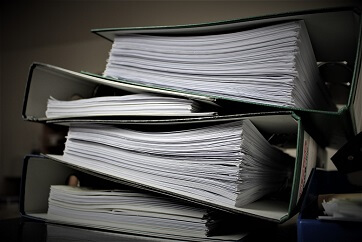It’s not surprising that governments can often get used to dealing with paper records. Unfortunately, the costs resulting from following such a process usually become an afterthought. It is important that local governments realize that paper records are extremely inefficient and come with costs – many of them hidden.
There are two sources of costs generally ascribed to paper records: printing costs and storage costs. Printing costs include buying the paper, the printers and the ink. Storage costs mainly refer to the storage room(s) necessary to house the records – this is usually a recurring cost.
Aside from the most common problems of paper records, governments often miss these additional pitfalls:
- IT Resources. Installing printer drivers is time consuming and can be a frustrating process for IT departments as different printers require different drivers – and these drivers can vary for different operating systems. As well, the space that printers take up in the room could be used for other things such as desks or extra computers for employees;
- Storage Maintenance. Paper records need to be maintained at a certain temperature to prevent damage over time. There are also other possible problems such as mold. If mold grows on records they need to be professionally cleaned. This maintenance can be expensive;
- Record Insurance. Records may need to be insured according to government legislation. This is often so expensive that municipalities end up self-insuring their documents;
- Transportation. If the storage space is off-site, there is a gas cost inherent in driving to and from that space;
- Search and retrieval time. With no intuitive records management system, search and retrieval of documents can constitute many hours of work and cost thousands of dollars per year;
- Lawsuits due to non-compliance. Cost of possible non-compliance due to damaged paper records or irretrievable records. These violations can open governments up to possible lawsuits;
- Recovery cost. In the event of a disaster, regulations may require governments to make every effort to recover records – sometimes requiring expensive methods such as freeze-drying;
- Morale loss. Employee morale loss from doing tedious tasks is a cost to governments – less happy workers are less productive workers.
Through digitization, Ricoh ECM solutions help local governments avoid unnecessary costs. With Ricoh,
- Documents can be stored in a secure electronic repository using intuitively organized folders. This leads to faster search and retrieval – taking seconds instead of hours;
- Electronic files mean no brick and mortar storage and your government is already ahead of the game when it comes to saving money. As the files are stored digitally there is no need to purchase paper or printers;
- Our solutions are extremely secure. Data can be stored on premises or on the cloud which eliminates the need to insure records;
- Our solutions integrate with existing hardware and software which also eliminates the need for new purchases. In fact, we are continually upgrading our technology so your government can be confident that the system it deploys with Ricoh remains on the cutting-edge.
In the end, the steps Ricoh can put in place for your municipality help to eliminate the biggest concern of all – compliance issues. Avoiding these circumstances is a major priority in how we approach your needs. We make it a priority to ensure records are managed according to your retention requirements so you don’t have to. Be free of the costs of paper records. Go digital with Ricoh!
Talk to a Ricoh representative about how to cut down your costs. |

































